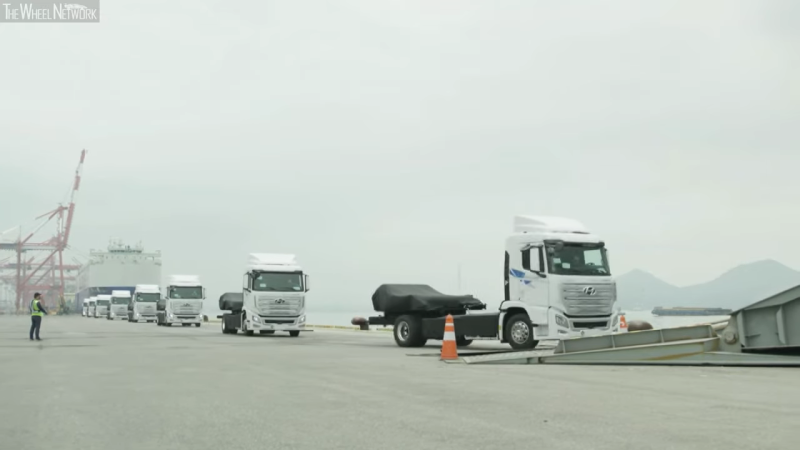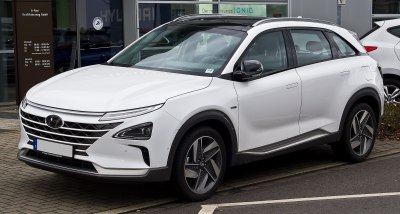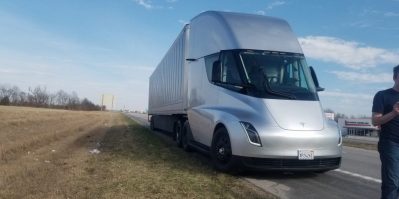Hyundai has begun shipping fuel-cell based heavy duty trucks to face off against battery-electric trucks in the commercial hauling market.
Battery electric vehicles, more commonly known as electric cars, have finally begun to take on the world in real numbers. However, they’re not the only game in town when it comes to green transportation. Fuel cells that use tanks of hydrogen to generate electricity with H2O as the main byproduct have long promised to take the pollution out of getting around, without the frustrating charge times. Thus far though, they’ve failed to make a major impact. Hyundai still think there’s value in the idea, however, and have developed their XCIENT Fuel Cell truck to further the cause.
400 km on 32 kg of Hydrogen

Hyundai has invested significant resources into the project, with the first 10 fuel cell trucks already shipped to Switzerland for use by commercial haulage firms, with plans for another 40 trucks to join in the field tests by the end of this year. The aim is to have 1600 trucks in service by 2025, meaning that there’s scope for production on the order of hundreds of units a year. This remains a drop in the ocean compared to global sales of millions per year for trucks in this class, but nevertheless shows a strong commitment to developing the technology.
With a range of 400 km on 32.1 kg of hydrogen, the trucks should have more than enough range between stops to do some serious work. While they’re unlikely to compete with diesel big rigs in the near term, short refueling times overcome one of the showstoppers present with all-electric vehicles. Hyundai’s next goal is to reach 1,000 km between refueling stops, which should come close to the average trucker’s shift length. The trucks use dual fuel cells capable of putting out 95 kW each for a total power of 190 kW. While this isn’t a huge number, the more important thing for such vehicles is torque. With the instant-on twist offered by electric motors, the Hyundai prime movers should hold their own against their classic diesel counterparts in this regard.

The company is no stranger to fuel cell technology, however. Like Toyota, they have had a presence in the marketplace for several years. The first major milestone for the Hyundai was the development of the Santa Fe FCEV, way back in 2001. Since then, they’ve forged ahead with new models in select markets around the world. The Nexo is the latest offering, with a 570 km driving range from 5.6kg of hydrogen. Despite being production ready, it’s not yet on open sale across the world. Limited infrastructure means owners in the US will have to relocate to California for the privilege.
Viability of Alternative Fuel Trucks
Cities around the world are pushing to eliminate fossil fuel vehicles, for the sake of both global climate and local pollution. While battery electric vehicles have traditionally been presented as the solution to this problem, their long recharge times and expense continue to draw detractors. While infrastructure is being built out around the world to support them, there remain significant edge cases that hamper take up for many.
Fuel cell vehicles have attractive qualities that circumvent some of the hangups people have about their battery-reliant cousins. Unlike a battery that can take, at best, tens of minutes to get a meaningful charge, fuel cell vehicles can replenish their hydrogen tanks in a similar time to that of conventional fossil fuel vehicles. In the ideal hydrogen-powered world, there’s also no need to have your own charger at home — simply drive to the hydrogen station and top up! Additionally, they maintain positive qualities like having no carbon dioxide output, not to mention other harmful pollutants like oxides of nitrogen and particulates. This is key for dense city centers that need frequent delivery of goods while maintaining strict emissions standards.
There remain two major bugbears of fuel cell technology. The first is infrastructure. As it stands, there are only a scattered handful of hydrogen refilling stations around the world. Despite fuel cell vehicles being on the market since 2014, only a few locations in the world actually have the necessary installations to make them usable. With a smaller installed base than their electric counterparts, this doesn’t look likely to change any time soon. The other is hydrogen production. Steam reforming techniques are cheap, but involve hydrocarbons that make the process dirty from an emissions standpoint, somewhat eliminating the gains of what is supposed to be clean transportation. Alternatively, electrolysis of water is a way to produce hydrogen that’s as clean as the electricity generation used to power the reaction. However, this is more expensive, and less efficient than simply using the electricity directly to charge a battery-powered vehicle.

The heavy haulage application of Hyundai’s trucks is a great opportunity for fuel cell technology, however. The problem of infrastructure is lessened for vehicles used in a commercial fleet. As they regularly operate out of depots, a small number of filling stations can be installed in a freight network at a more affordable cost, versus having to install hydrogen stations everywhere for the commuter population. Additionally, it’s possible for the companies involved to ensure that their hydrogen is sourced from clean processes in order to maintain the climate benefits of the project. It’s also a promising way for heavy vehicles to continue their work in and around cities that have banned more polluting vehicles. Battery-electric trucks are competing hard for this market, but for companies that wish to do away with the hassle of slow charge times, fuel cells will offer a compelling alternative.
The chances of fuel cells beating out battery electric vehicles in the commuter market seems slim, with offerings from the likes of Tesla, Nissan, and other automakers outselling their hydrogen rivals thousands of times over. However, the battle for clean trucking is only just beginning. With a viable solution to the recharging problem, and the possibility of building out hydrogen infrastructure along major freight roadways, there’s a good likelihood that the trucks hauling your next online order could very well be powered by fuel cells!
"fuel" - Google News
July 17, 2020 at 12:01AM
https://ift.tt/3fMBVZ2
Hyundai Makes Push Towards Fuel Cell Trucking - Hackaday
"fuel" - Google News
https://ift.tt/2WjmVcZ
Bagikan Berita Ini














0 Response to "Hyundai Makes Push Towards Fuel Cell Trucking - Hackaday"
Post a Comment